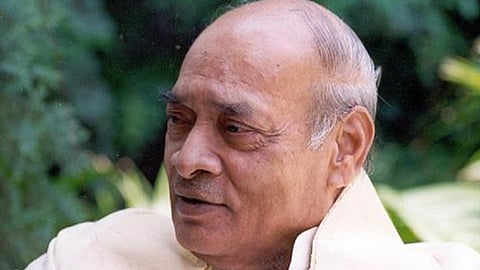

What would have been the reaction of former prime minister PV Narasimha Rao to the Modi government’s decision to award him the Bharat Ratna? Perhaps, a long pause and, “no comment”… Or philosophical as he was, a simple nod with a namaskar. Frankly, one wouldn’t know what would have passed through his mind. He had done his part and the rest is history. In his own words, “one has to erase oneself to objectively look at history.” In that spirit, if we look at his long service to the nation, a few seemingly contradictory traits stand out.
He was without a doubt a nationalist. After all, was he not banished from school for singing Vandemataram before Independence? Later, as the chief minister of the then Andhra Pradesh, did he not seek to bring in land reforms? The second characteristic was his immense fortitude and self-restraint. A man of letters but of few words, he curbed his rebellious instincts and kept his idealism in check for decades under Indira, and Rajiv Gandhi.
Thirdly, he was a scholar and a philosopher – it is said that when he was contemplating retirement in 1991, he had received feelers from Sri SiddheswariPitam at Courtallam in Tamil Nadu. Had he not become the Prime Minister, he might have become a Swami. Compare these with his stint in power from 1991-1996.
A real Kautilya emerged from the shadows who brought the nation back from the brink of economic collapse, effected a paradigm shift in foreign policy and successfully fought terrorism. In the political world, he co-opted opposition leaders for national good, but in one fell swoop, tainted his rivals in his party and the opposition in cases. Why he did what he did is up for debate but what is non-debatable is that his successors Atal Bihari Vajpayee, Manmohan Singh and Narendra Modi in their own ways followed him, one way or another, effectively or otherwise.
By awarding him the Bharat Ratna, the Modi government has sought to cement and own his legacy, which was brought into dispute by his own party, the Congress, for his failure to prevent the demolition of the Babri Masjid. It is no coincidence that the BJP has conferred the highest civilian honour on Vajpayee first, then Advani, and now PVN – three major players in the Ayodhya movement.
The last two were bestowed the award soon after the consecration of Ram Lalla at the Ram Mandir in Ayodhya. In a sense, this is a perfect closure to the issue. From a historical perspective, it is also a continuation of the BJP’s strategy of co-opting leaders from other parties and owning their legacy, reducing the Congress to nothing more than a family party of the Gandhi family devoid of icons other than Nehru and Indira.
This may not yield immediate political dividends but in the long course of history, the saffron party could well claim to epitomise the spirit of the nationalist leaders in the collective psyche of the nation. Specifically in the case of PV Narasimha Rao, the Congress may find it difficult going forward to claim even the credit for economic reforms because it cannot take the name of Manmohan Singh without recalling the former prime minister. Singh’s place in history is tarnished by his years at the helm of the UPA-2, notwithstanding his personal credentials. History may be kinder to him still but surely, it has rehabilitated his mentor.
Telugu-speaking people, especially, would be gratified with the Bharat Ratna for PVN. Though he wasn’t a mass leader from the then-united Andhra Pradesh and wasn’t particularly preoccupied with state affairs, his ascension to the top job was seen as a recognition and matter of pride for Telugus. A person who was close to the former PM told this newspaper what kind of a politician he was. “Normally, these days, politicians go to prestigious clubs or fancy hotels to relax. PV Narasimha Rao would visit Koti Khadi Bhandar to relax regularly! He would sit there to avoid the crowds and be himself. Even when he was the chief minister, he would go to the Telugu Academy to be by himself. He also had a habit of attending music concerts.“
Detached and for all his intellectual prowess, he was also a grassroots politician – a rarity these days. In fact, he fought in every election from 1952 till his last one only for either Lok Sabha or Assembly. He was never a member of the Rajya Sabha or the Council.
No wonder, the humiliation heaped upon him by the Sonia Gandhi-led Congress even in his death still rankles in the minds of many on par with the insult faced by Anjaiah at the hands of Rajiv Gandhi in the early 80s. PVN’s family members are in the BJP and BRS now, and the latter celebrated his centenary too. Feeble attempts at this juncture may not suffice to reclaim the man’s legacy. The Congress, perhaps, needs another PV Narasimha Rao to do that and more.